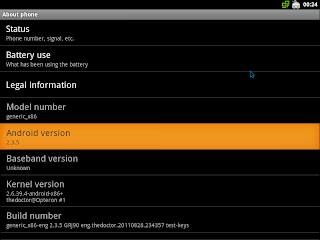Sunday, November 20, 2011
Sunday, October 30, 2011
Android-x86 updated to 2.3.7
The gingerbread-x86 branch has been updated to AOSP 2.3.7 release. And a new target has been added: amd_persimmon
I'll build a new ISO as soon as I can and upload it for testing.
I'll build a new ISO as soon as I can and upload it for testing.
Tuesday, September 13, 2011
Android-x86 Gingerbread 2.3 RC1 (Test build 20110828)
The Android-x86 project is glad to announce a new test build 20110828 for public testing. Live CD ISOs are available from the usual sites. Here's my generic_x86 compile of Android-x86 2.3 from August 28, 2011. Whenever my internet connection speeds back up I'll re-sync, re-compile, and re-upload the newest Android "Gingerbread" 2.3 RC1 test build.
Labels:
20110828,
Android,
Android-x86,
generic_x86,
Gingerbread,
Gingerbread-x86
Thursday, August 11, 2011
Gingerbread x86 pt3 and some light reading
Gingerbread x86 2.3.5 has been baked and is ready to be served! I built a new ISO, and while hardware acceleration still isn't available in the generic branch (leaving the photo gallery and live wallpapers slow and practically useless) it's still a nice build.
On a different note, I've been doing some light reading and I've been truly enjoying The True Grimoire by Jake Stratton-Kent. I haven't been working on any new music lately, or even playing the keyboard as much. Inspiration while strike when it's ready I suppose.
On a different note, I've been doing some light reading and I've been truly enjoying The True Grimoire by Jake Stratton-Kent. I haven't been working on any new music lately, or even playing the keyboard as much. Inspiration while strike when it's ready I suppose.
Labels:
2.3.5,
Android,
Android-x86,
Gingerbread,
Grimorium Verum,
Jake Stratton-Kent,
True Grimoire
Monday, July 18, 2011
Android Gingerbread x86 part 2
The folks at Android-x86 Project have updated their codebase and ethernet support has been added to the gingerbread-x86 branch. I made a new build the other night and it's working great! I'm also really excited that the keyboard is in English now. That was a surprise because I didn't see any documentation mentioning a change.
Tuesday, June 21, 2011
Android Gingerbread x86

I've become more and more interested in Android lately, specifically Android x86. Today I built my own Gingerbread x86 using Android-x86 Project's instructions and with a little help from a friend who's Linux knowledge greatly exceeds my own. In order to build Android for x86 you need to compile the Android source code from android-x86.org's git repositories. Since Gingerbread x86 can only be compiled on a 64 bit build environment I used my Ubuntu Studio x64 (10.04) install on my AMD Opteron 165 desktop. I'm going to detail the steps I had to take to complete this process to help anyone out there who may have had the same problems as I did.
After Initializing a build environment, I went ahead and moved on to obtain the source code. I made my working directory, android-x86, in my home folder. I also had to download repo using
git://android.git.kernel.org/tools/repo.gitand copy the contents of the newly downloaded repo folder to my android-x86 folder. Then I had to change the word python in line 23 of the repo file to python2.6 (this was necessary because for some reason the Python 2.7 was causing errors when I tried to run repo). So now I had my /home/android-x86 with the repo files inside and the modified repo file to point to Python 2.6. In terminal, I cd'd to android-x86 and typed the following:
./repo init -u git://android-x86.git.sf.net/gitroot/android-x86/manifest.git -b gingerbread-x86After receiving the manifest I had to enter a username and my email address, and whether I wanted to have colored text (never saw any colored text even though I said yes). Once repo was initialized I ran
./repo syncIf you havent noticed by now I had to use slightly different commands than the ones given on the website. I let repo do its thing and when it completed, I had to do the repo init command again using git://git.android-x86.org/manifest.git instead of git://android-x86.git.sf.net/gitroot/android-x86/manifest.git because apparently the sourceforge link missed a few things it needed to download. Once my build tree was complete I had a ~3.1GB android-x86 folder and I was almost ready to build my ISO. I had run into an error while building the ISO and after some googling I found a forum post with a command that fixed my problem with lstdc++:
sudo ln -s /usr/lib32/libstdc++.so.6 /usr/lib32/libstdc++.soSo now I could start building my ISO! I ran the command
make -j2 iso_img TARGET_PRODUCT=generic_x86The whole building process took a while but when it finished I ended up with a 174.9MB ISO
.
Labels:
Android,
Android-x86,
Gingerbread,
libstdc++,
lstdc++,
readline,
repo
Subscribe to:
Comments (Atom)





